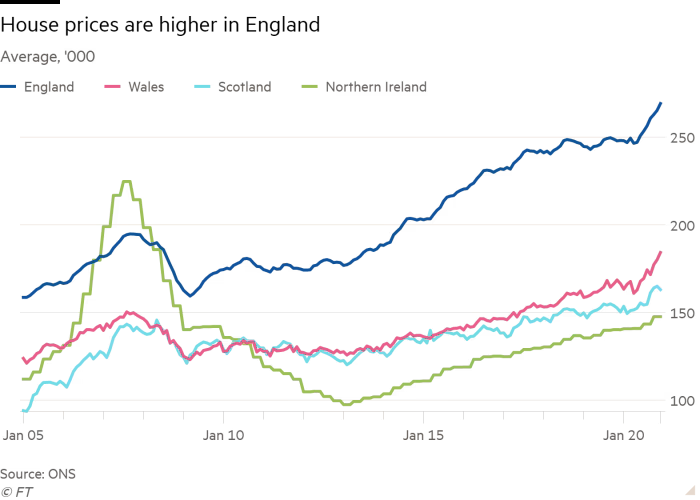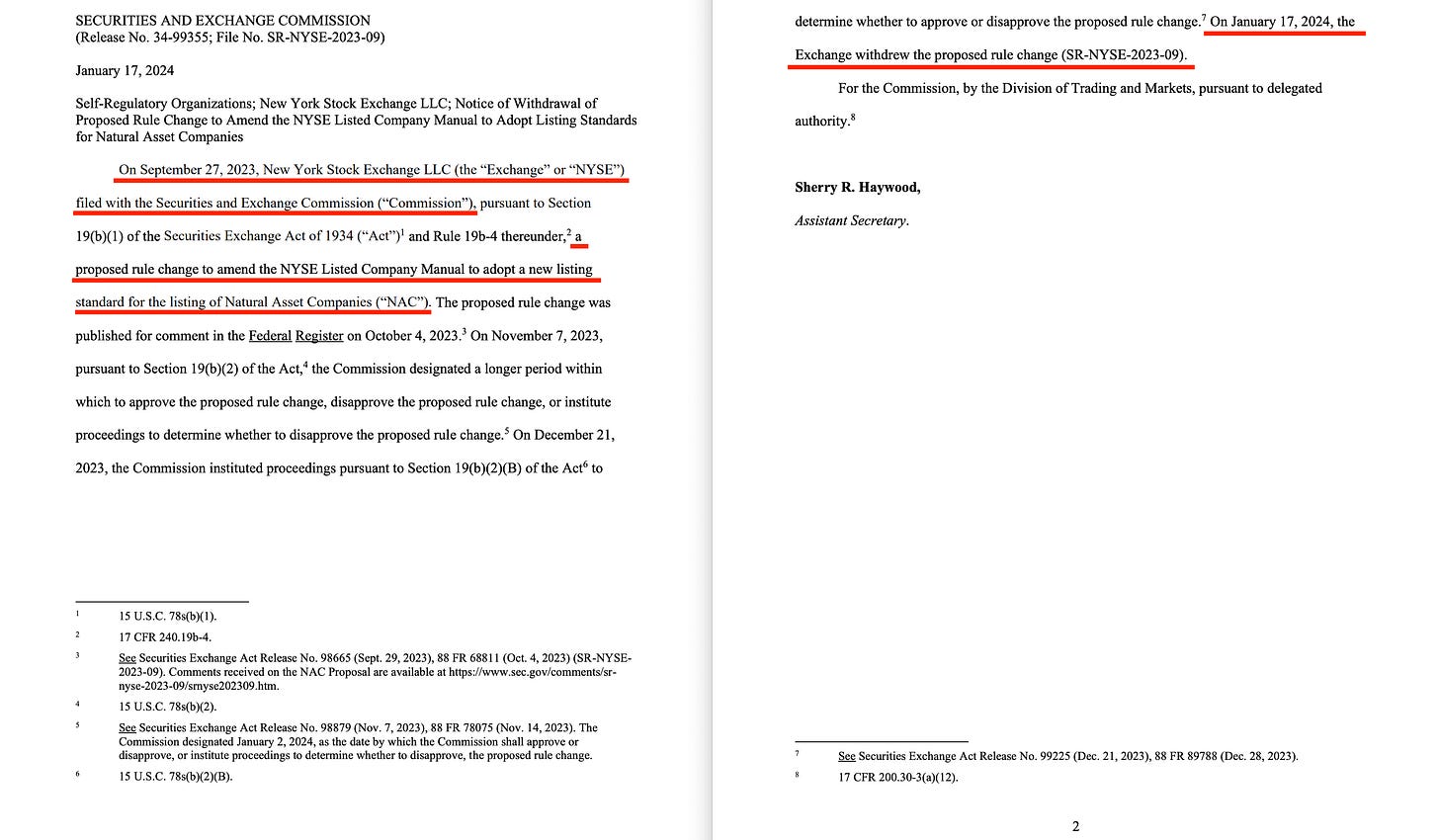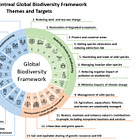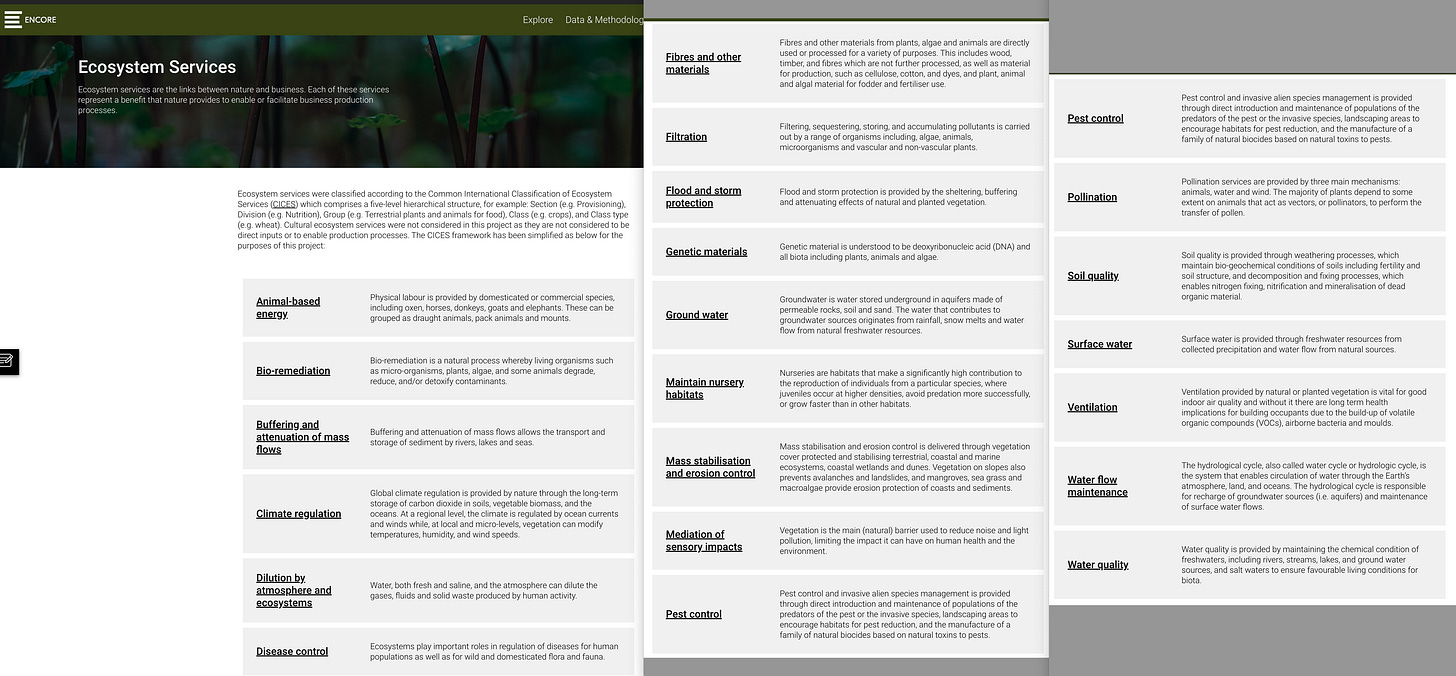Ultimately, this is about the ‘new economy’ which centers around ‘biodiversity’ and ‘ecosystem services’. But to get there, we need money.
And that’s where former Bank of England governor, former Bank of Canada governor, co-chair for the Glasgow Finance Alliance for Net Zero, Arnhold Distinguised Fellowship Program Board with Conservation International member, former Financial Stability Board chair, former Global Economy Meeting and Economic Consultative Committee of the Bank for International Settlements, former vice-chair of European Systemic Risk Board, Group of Thirty member, Foundation Board of the Chatham House Panel of Senior Advisors, and foundation board of the World Economic Forum, Mark Carney, comes in.
In other words, you’ll struggle to find someone more clued in on - and aligned with - the new economic paradigm centered around biodiversity.
-
Mark Carney rose to fame, blowing up an epic housing bubble in Canada. He then arrived in the UK, … only to further inflate our already epic housing bubble.
And as you might have noticed above, he’s also part of several groups relating to the exciting new field of Convention on Biological Diversity centered finance, which definitely isn’t a scam. And in 2016, he announced that the world would need to spend $7 trillion on infrastructure over the next 15-20 years for sakes of saving… maybe a handful of mayflies and an otter with bad hearing in East Sussex.
And all of that was announced, while speaking with the Canadian Environment and Climate Change Minister.
But there’s one particular - and noteworthy - job missing from that otherwise impressive list. With the United Nations. Which is just spectacular.
And I’m unsure if you’ve heard of it before, but the website on the right, that’s the One Planet Summit, where the NGFS launched in 2017 -
‘The NGFS, which was launched by its eight first members at the One Planet Summit in December 2017, now comprises 134 central banks and supervisors, together with 21 observers responsible for the oversight of :
100% of the global systematically important banks
80% of the internationally active insurance groups‘
Which, in fairness, is very impressive. I also question how drunk I was to agree to a such vast, vast concentration of power in so few hands.
Oh, and then there’s the matter of the above Yahoo article being released prior to the inaugural launch of the One Planet Summit, and hence the announcement of the initiative…
I found the inaugural press release on the Bank of France’s webpage, and it is they who run the… ‘secretariat’… but the press release has since been deleted. So much for transparency, it would appear. The objective, as it states, is to ‘mobilize mainstream finance to support the transition toward a sustainable economy’, which entails that it should aim to ‘enhance the role of the financial system to manage risks and to mobilize capital for green and low-carbon investments‘.
Thing is - those central banks. They’re supposed to be responsible for monetary policy, and monetary policy only. This appears a somewhat vast breach of their mandate. Could you imagine if the central banks themselves didn’t also carry out the regulatory duties? I mean, what’s next - Bernie Madoff operating without oversight?
Regardless, that debate is a total waste of time, because it hinges upon an expectation of the social contract still being intact, and the world of politics… not being outrageously corrupt as a result of the purposeful actions of those who claim to care about ‘transparency’, and ‘good governance’… whilst simultaneously laughing about expressly those claims in the corridors of power.
No, the reason why I bring all of this up, is to cement the fact that Mark Carney - and the NGFS, and hence, central bankers - are absolutely aligned with, and core actors of this new world of biodiversity finance absurdity. And consequently, when you find a document of their own outlining the absurdity of it all in plain language, then it is a little hard to dismiss. The quality of evidence is very high, though I’m sure some will look the other way regardless. ‘…, but the Guardian says…’
Enter this paper - ‘The Green Scorpion: the MacroCriticality of Nature for Finance’, released on the 13th of December, 2023. You can’t even play the ‘out of date’ card, given it’s only around a month old. And it kicks off with a set of terms, defining the core components of this utterly insane ‘new economy’ -
‘Biodiversity is defined as the “variability among living organisms from all sources including, inter alia, terrestrial, marine and other aquatic ecosystems and the ecological complexes of which they are part; this includes diversity within species, between species and of ecosystems.” (CBD, 1992).‘
Diversity within species? Diversity between species? Diversity of ecosystems?
Let me just do a quick summary here; that’s practically infinite, times practically infinite, times practically infinite. I honestly feel as though I should do a ‘case closed’, because the entire thing is preposterous, and it’s already summed up right here.
‘Ecosystem services “The benefits (and occasionally disbenefits or losses) that people obtain from ecosystems. These include provisioning services such as food and water; regulating services such as flood and disease control; and cultural services such as recreation, ethical and spiritual, educational and sense of place”‘
There is absolutely no way they can calculate the value of ‘flood control’ because that to a very high extent depends upon the weather… which they can’t predict. What follows is ‘disease control’, which clearly will constitute fraudulent claims about zoonotic diseases, and will hence be assigned a completely arbitrary, made-up value. But worse, ‘cultural services such as recreation, ethical and spiritual, educational and sense of place‘. All of those are subjective. All of those. Not in a trillion years can they even assign a value of a single one of those to me today, because who’s to say if I even feel like walking through that forest in the first place, given that the wife might have well dragged me there, in fact, probably did.
‘Nature’s contribution to people “are all the contributions, both positive and negative, of living nature (i.e., all organisms, ecosystems, and their associated ecological and evolutionary processes) to people’s quality of life.”‘
Uhuh. Now they assign a value to the quality of life. They quite seriously believe they’re Gods. No wonder you’ll get fired for questioning climate science through ethics panels soon enough.
‘Natural capital “A concept referring to the stock of renewable and non-renewable natural resources (plants, animals, air, water, soils, minerals) that combine to yield a flow of benefits to people”. Within the IPBES conceptual framework, it is part of the nature category, representing an economicutilitarian perspective on nature, specifically those aspects of nature that people use (or anticipate to use) as source of Nature's contributions to people”‘
The value of the benefits above? Guesswork. This here? Compound guesswork.
‘Nature-related financial risks (NGFS, 2023) “risks of negative effects on economies, financial institutions and financial systems that result from: i. the degradation of nature, including its biodiversity, and the loss of ecosystem services that flow from it (i.e., physical risks); or ii. the misalignment of economic actors with actions aimed at protecting, restoring, and/or reducing negative impacts on nature (i.e., transition risks)”.‘
Right, so the former is a model, seeking to reflect some… random number… of potential loss of ‘ecosystem services’, and the latter is about a misalignment which fundamentally is impossible to predict, though sadly, I can tell you exactly how it will be… used against you. They will model an outcome, and then judge you accordingly.
Look, before I even go on, if you agree with any of this, then I would recommend simply handing over ever penny in your pension fund, because they will steal it anyway.
And I see that the Natural Asset Company rule change has been withdrawn… for the time being… in the US. Of course, they’ll try again. They’ll probably nuke Iran, and then sneak it through with your focus over there while having their obviously paid off MSM talking about ‘humanitarian values’. Or perhaps they’ll simply pass it in London, and then fearmonger about the US economy collapsing unless they get this particular vehicle of outright extortion through.
And then they’ll crow about how rich it’ll make you as they monetise blue carbon credits via a GEF-blended finance structure targeting an UNESCO Biosphere reserve in… rolls dice… Malaysia. No, really.
But back to the main document, and specifically, the executive summary - which I really only bother going through as it drags in a few particular actors - further declares the Kunming-Montreal Global Biodiversity Framework ‘the equivalent of the Paris Agreement for climate change‘, which sets ‘an ambitious pathway towards the global vision of a world living with nature by 2050’.
Sure. Because most of us will be dead.
‘The GBF will be a an increasingly strong driving force for action, in the same way as the Paris Agreement has been on climate. This itself creates transition risks but also significant opportunities for proactive financial institutions.‘
Yeah, you’ll be taxed to oblivion, and those ‘proactive financial institutions’ will front-run the market in exactly the same way ICSU/SCOPE has front-run the ‘best available science’ on ‘global warming’ through invitation-only events.
‘For Central Banks, there is also a need to identify and address any systemic or structural issues such as regulatory gaps, inadequate oversight or the potential for speculative bubbles that may contribute to financial instability and provide guidance to firms to minimise conditions that could lead to such a crisis.‘
About 25 years ago, a friend of mine made a significant return in a short period of time trading on NASDAQ. You know what the exchange did? They unwound the trade. That’s roughly what will happen here. If you win the jackpot, they’ll switch off the machine.
‘The main objective of this report is to draw upon the science and economics of nature…‘
The best science available. The best science available. The best science available.
Create a lie, make it big; eventually you’ll come to believe the best available science… which you’ll get fired for questioning in professional capacity, due to those ‘ethics declarations’ you were forced to sign when joining your present employer.
‘These direct impacts could be amplified by cascading feedbacks across markets, and act as a risk multiplier on climate change, leading to significant impacts on people and economies, as well as the global financial system. It is important to note that in this study, we look at only five ecosystem services; subsequent work will provide analyses for all twenty services identified in the ENCORE database. As such, these estimates should be treated very much as a lower bound‘
It’s pure guesswork. It’s a contemptuous claim that they can tame chaos. Well, except that they fully know well that they can’t. Much as we can’t predict the path of an ant crossing a garden tile, or - much less - a tornado heading towards New Orleans, this belief that if only we had enough data, then we could predict the uncertainty principle.
The reality of course is that all of this is to push through the global surveillance apparatus, which will then be turned on you, and used as input for the Convention on Biological Diversity, and the 100 Aichi Targets through GBIOS, which is an extension of GEO BON, which follows from GEOSS, and GTOS, and ultimately GEMS.
Anyway, I’ve covered most of this material before, but this document explicitly drags in the central banks, as well as the IPBES who ‘blocked me for trolling’, clearly. Nevermind them trolling us with the utter fraud they perpetuate.
But there’s a third reference - and it’s ‘the ENCORE database‘. Supposedly, there’s a list of 20 ‘ecosystem services’, just waiting for us to discover. And I don’t know about you, but I’m excited, mainly because I really do look forward to them demonstrating that inversion of an infinitely large matrix. In fact, I’m sure there’s a Nobel prize waiting for this team, somewhere.
But before I close out this document I wish to state one thing unequivocally - this lot wasted way too much time playing Civilization, because what they obviously intend to do is have some ‘approximation’ apply to each ‘landscape tile’. Which, frankly, makes a total mockery of the accuracy of their entire ‘science’ in the first place, outing it all for what it all is - a total scam, intended to steal every single penny in your name, something they indirectly own up to on page 25 -
I won’t even bother quoting. This is too dumb for words. They are trying to stuff infinite complexity into a box, predict the unpredictable, divide by zero. It won’t work, and they bloody well know. It’s fraud. It’s the biggest scam of all time.
… so, about that ENCORE database.
Yes, you can find the list of ‘ecosystem services’ over here.
No, this is not a joke.
Of… potentially measurable quantities we have ground water, soil quality, water quality, … and… er, that’s probably about it.
Then we have ‘Genetic material is understood to be deoxyribonucleic acid (DNA) and all biota including plants, animals and algae‘
… which is infinitely complex.
‘Disease control - Ecosystems play important roles in regulation of diseases for human populations as well as for wild and domesticated flora and fauna‘
… which is infinitely complex.
‘Mediation of sensory impacts - Vegetation is the main (natural) barrier used to reduce noise and light pollution, limiting the impact it can have on human health and the environment.‘
… god damn, is this a joke? I feel as though this is an elaborate joke, which for some reason, central bankers are all in on. Unfortunately, the answer of course is yes, but those central bankers are laughing at us, not with us.
‘Pollination - Pollination services are provided by three main mechanisms: animals, water and wind. The majority of plants depend to some extent on animals that act as vectors, or pollinators, to perform the transfer of pollen.‘
Setting aside waterflow - which also is indeterministic - so now they can predict the wind, and hence the transfer of pollen in spite of not being able to predict the path of a tornado?
Utter, utter, utter, utter, utter, … breathe…, utter, utter, utter quack science.
‘Ventilation - Ventilation provided by natural or planted vegetation is vital for good indoor air quality and without it there are long term health implications for building occupants due to the build-up of volatile organic compounds (VOCs), airborne bacteria and moulds.‘
It’s fraud. That’s what it is. The entire field is fraud. And the only - only - way they will escape eventual exposure is through outright censorship.
Which is why the WEF is now pushing hard for expressly that.
And yet, we trust those central bankers with monetary policy.
WHY?
-
The document isn’t the only one on the topic, for the record. Here’s another, which amusingly claims that ‘evidence is emerging of the relationships between biodiversity and price stability although much more work is required on this topic.’
Much more work, indeed.
And there’s even one courtesy of that Basel institution, though it fairness, it’s one of very few providing a smidgen of honesty -
‘Better accounting systems for natural capital are necessary to internalise climate externalities, but it should be recognised that the concepts of natural capital and ecosystem services are difficult to define precisely. For instance, pricing and payment mechanisms for ecosystem services can hardly account for the inherent complexity of any given ecosystem (eg all the services provided by a forest) and often lead to trade-offs by valuing a subset of services only, sometimes to the detriment of others…‘
… which is about as close to ‘it won’t work’ that you’ll ever get out of them.
… and the Dutch National Bank? They released this report. It’s more of the same.
And as for Mark Carney - though exceptionally busy he appears - he released a book in 2021, titled ‘Value(s): Building a Better World for All‘. I think I’ll let it speak for itself.


























Hi fascinating insight. We'd love to have you on New Zealand 's Reality Check Radio as we seem to be absolutely gung-ho about biodiversity credits.(
https://consult.environment.govt.nz/biodiversity/nz-biodiversity-credit-system/)
Email : jaspreet@realitycheck.radio
Cheers